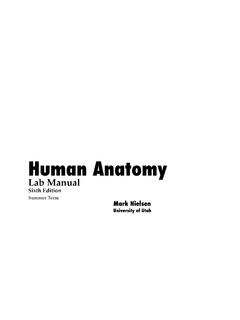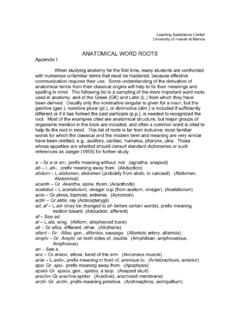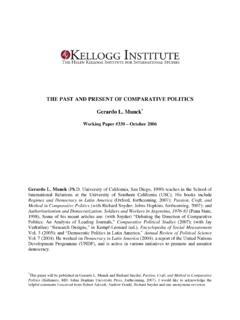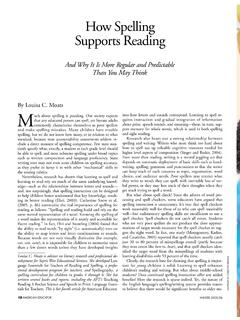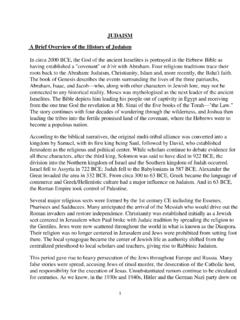Transcription of The Historical Roots of Our Ecological Crisis
1 The Historical Roots of Our Ecological Crisis Lynn White. 1967. Science 155: 1203-1207. A conversation with Aldous Huxley not infrequently put one at the receiving end of an unforgettable monologue. About a year before his lamented death he was discoursing on a favorite topic: Man's unnatural treatment of nature and its sad results. To illustrate his point he told how, during the previous summer, he had returned to a little valley in England where he had spent many happy months as a child. Once it had been composed of delightful grassy glades; now it was becoming overgrown with unsightly brush because the rabbits that formerly kept such growth under control had largely succumbed to a disease, myxomatosis, that was deliberately introduced by the local farmers to reduce the rabbits' destruction of crops. Being something of a Philistine, I could be silent no longer, even in the interests of great rhetoric. I interrupted to point out that the rabbit itself had been brought as a domestic animal to England in 1176, presumably to improve the protein diet of the peasantry.
2 All forms of life modify their contexts. The most spectacular and benign instance is doubtless the coral polyp. By serving its own ends, it has created a vast undersea world favorable to thousands of other kinds of animals and plants. Ever since man became a numerous species he has affected his environment notably. The hypothesis that his fire-drive method of hunting created the world's great grasslands and helped to exterminate the monster mammals of the Pleistocene from much of the globe is plausible, if not proved. For 6 millennia at least, the banks of the lower Nile have been a human artifact rather than the swampy African jungle which nature, apart from man, would have made it. The Aswan Dam, flooding 5000 square miles, is only the latest stage in a long process. In many regions terracing or irrigation, overgrazing, the cutting of forests by Romans to build ships to fight Carthaginians or by Crusaders to solve the logistics problems of their expeditions, have profoundly changed some ecologies.
3 Observation that the French landscape falls into two basic types, the open fields of the north and the bocage of the south and west, inspired Marc Bloch to undertake his classic study of medieval agricultural methods. Quite unintentionally, changes in human ways often affect nonhuman nature. It has been noted, for example, that the advent of the automobile eliminated huge flocks of sparrows that once fed on the horse manure littering every street. The history of ecologic change is still so rudimentary that we know little about what really happened, or what the results were. The extinction of the European aurochs as late as 1627 would seem to have been a simple case of overenthusiastic hunting. On more intricate matters it often is impossible to find solid information. For a thousand years or more the Frisians and Hollanders have been pushing back the North Sea, and the process is culminating in our own time in the reclamation of the Zuider Zee. What, if any, species of animals, birds, fish, shore life, or plants have died out in the process?
4 In their epic combat with Neptune have the Netherlanders overlooked Ecological values in such a way that the quality of human life in the Netherlands has suffered? I cannot discover that the questions have ever been asked, much less answered. People, then, have often been a dynamic element in their own environment, but in the present state of Historical scholarship we usually do not know exactly when, where, or with what effects man-induced changes came. As we enter the last third of the 20th century, however, concern for the problem of ecologic backlash is mounting feverishly. Natural science, conceived as the effort to understand the nature of things, had flourished in several eras and among several peoples. Similarly there had been an age-old accumulation of technological skills, sometimes growing rapidly, sometimes slowly. But it was not until about four generations ago that Western Europe and North America arranged a marriage between science and technology, a union of the theoretical and the empirical approaches to our natural environment.
5 The emergence in widespread practice of the Baconian creed that scientific knowledge means technological power over nature can scarcely be dated before about 1850, save in the chemical industries, where it is anticipated in the 18th century. Its acceptance as a normal pattern of action may mark the greatest event in human history since the invention of agriculture, and perhaps in nonhuman terrestrial history as well. Almost at once the new situation forced the crystallization of the novel concept of ecology; indeed, the word ecology first appeared in the English language in 1873. Today, less than a century later, the impact of our race upon the environment has so increased in force that it has changed in essence. When the first cannons were fired, in the early 14th century, they affected ecology by sending workers scrambling to the forests and mountains for more potash, sulphur, iron ore, and charcoal, with some resulting erosion and deforestation. Hydrogen bombs are of a different order: a war fought with them might alter the genetics of all life on this planet.
6 By 1285 London had a smog problem arising from the burning of soft coal, but our present combustion of fossil fuels threatens to change the chemistry of the globe's atmosphere as a whole, with consequences which we are only beginning to guess. With the population explosion, the carcinoma of planless urbanism, the now geological deposits of sewage and garbage, surely no creature other than man has ever managed to foul its nest in such short order. There are many calls to action, but specific proposals, however worthy as individual items, seem too partial, palliative, negative: ban the bomb, tear down the billboards, give the Hindus contraceptives and tell them to eat their sacred cows. The simplest solution to any suspect change is, of course, to stop it, or better yet, to revert to a romanticized past: make those ugly gasoline stations look like Anne Hathaway's cottage or (in the Far West) like ghost-town saloons. The "wilderness area" mentality invariably advocates deep-freezing an ecology, whether San Gimignano or the High Sierra, as it was before the first Kleenex was dropped.
7 But neither atavism nor prettification will cope with the ecologic Crisis of our time. What shall we do? No one yet knows. Unless we think about fundamentals, our specific measures may produce new backlashes more serious than those they are designed to remedy. As a beginning we should try to clarify our thinking by looking, in some Historical depth, at the presuppositions that underlie modern technology and science. Science was traditionally aristocratic, speculative, intellectual in intent; technology was lower-class, empirical, action-oriented. The quite sudden fusion of these two, towards the middle of the 19th century, is surely related to the slightly prior and contemporary democratic revolutions which, by reducing social barriers, tended to assert a functional unity of brain and hand. Our ecologic Crisis is the product of an emerging, entirely novel, democratic culture. The issue is whether a democratized world can survive its own implications. Presumably we cannot unless we rethink our axioms.
8 The Western Traditions of Technology and Science One thing is so certain that it seems stupid to verbalize it: both modern technology and modern science are distinctively Occidental. Our technology has absorbed elements from all over the world, notably from China; yet everywhere today, whether in Japan or in Nigeria, successful technology is Western. Our science is the heir to all the sciences of the past, especially perhaps to the work of the great Islamic scientists of the Middle Ages, who so often outdid the ancient Greeks in skill and perspicacity: al-Razi in medicine, for example; or ibn-al-Haytham in optics; or Omar Khayyam in mathematics. Indeed, not a few works of such geniuses seem to have vanished in the original Arabic and to survive only in medieval latin translations that helped to lay the foundations for later Western developments. Today, around the globe, all significant science is Western in style and method, whatever the pigmentation or language of the scientists. A second pair of facts is less well recognized because they result from quite recent Historical scholarship.
9 The leadership of the West, both in technology and in science, is far older than the so-called Scientific Revolution of the 17th century or the so-called Industrial Revolution of the 18th century. These terms are in fact outmoded and obscure the true nature of what they try to describe--significant stages in two long and separate developments. By 1000 at the latest--and perhaps, feebly, as much as 200 years earlier--the West began to apply water power to industrial processes other than milling grain. This was followed in the late 12th century by the harnessing of wind power. From simple beginnings, but with remarkable consistency of style, the West rapidly expanded its skills in the development of power machinery, labor-saving devices, and automation. Those who doubt should contemplate that most monumental achievement in the history of automation: the weight-driven mechanical clock, which appeared in two forms in the early 14th century. Not in craftsmanship but in basic technological capacity, the latin West of the later Middle Ages far outstripped its elaborate, sophisticated, and esthetically magnificent sister cultures, Byzantium and Islam.
10 In 1444 a great greek ecclesiastic, Bessarion, who had gone to Italy, wrote a letter to a prince in Greece. He is amazed by the superiority of Western ships, arms, textiles, glass. But above all he is astonished by the spectacle of waterwheels sawing timbers and pumping the bellows of blast furnaces. Clearly, he had seen nothing of the sort in the Near East. By the end of the 15th century the technological superiority of Europe was such that its small, mutually hostile nations could spill out over all the rest of the world, conquering, looting, and colonizing. The symbol of this technological superiority is the fact that Portugal, one of the weakest states of the Occident, was able to become, and to remain for a century, mistress of the East Indies. And we must remember that the technology of Vasco da Gama and Albuquerque was built by pure empiricism, drawing remarkably little support or inspiration from science. In the present-day vernacular understanding, modern science is supposed to have begun in 1543, when both Copernicus and Vesalius published their great works.

